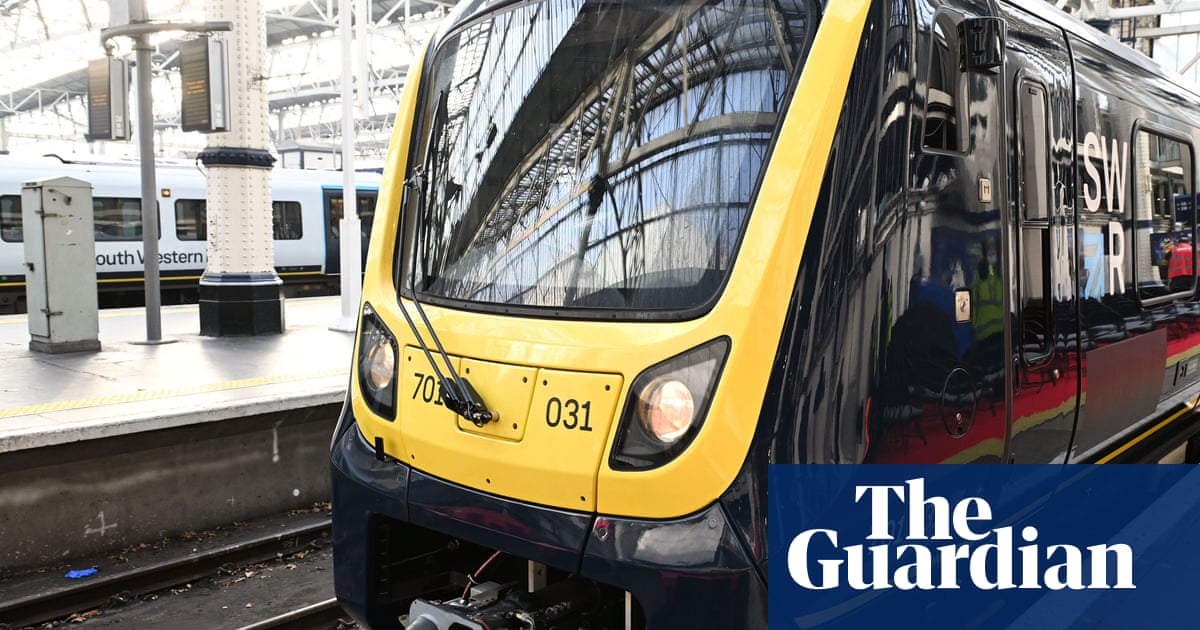Ministers have hailed a “new dawn” for Britain’s railways as the first train services renationalised under theLabourgovernment started operating on Sunday.
The 6.14 from London Waterloo to Shepperton was due to be the first rebranded train out on Sunday, its carriages adorned with a union jack and the logo “Great British Railways: coming soon” as part of a publicly owned South Western Railway (SWR).
However, the very first renationalised SWR service was in fact set to involve a rail replacement bus: the 5.36 from Woking to Waterloo having to terminate at Surbiton because of bank holiday weekend engineering works.
The transport secretary, Heidi Alexander, said there would be a “cultural reset” for the railway, with further legislation expected this year to overhaul the industry and integrate track and train operations asGreat British Railways(GBR), rather than under Network Rail and separate train firms.
SWR was the firstplanned nationalisationunder the Passenger Railway Services (Public Ownership) Act 2024, which was passed soon after the general election.
Speaking before the departure of the first branded train, Alexander said: “I really do feel that this is a new dawn for our railways. We’re going to wave goodbye to 30 years’ worth of inefficiency, waste, passenger frustration, and we’re going to step really confidently towards a new future for the railways.”
Alexander added: “Of course, change isn’t going to happen overnight. We’ve always been clear that public ownership isn’t a silver bullet, but we are really firing this starting gun in that race for a truly 21st-century railway, and that does mean refocusing away from private profit and towards the public good.”
SWR will be run by the government-owned train operator, DfTO, which already runs a number of services – such as LNER, Northern, TPE and Southeastern – that were taken back into public control because of financial or contractual failures. The remaining nine privately run rail franchises will be renationalised by the end of 2027 as contracts expire. The government claims that the changes will save £150m a year in fees alone.
Alexander said bigger changes would become evident with the formation of GBR, the new body overseeing all aspects of the railway, which is now expected to be established in early 2027.
Once running, passengers would start to notice the difference, she said. “Not just fewer cancellations and simpler tickets, but a real, fundamental cultural reset with one railway team working as one team.
“Regional services earning the right to wear the Great British Railways badge, and that will be a new organisation that will be completely dedicated to public service.”
FirstGroup, the private firm that had run SWR since 2017 and stands to lose more lucrative franchises, said it had made “hundreds of millions of pounds of improvements” to trains and customer service during its tenure.
Sign up toBusiness Today
Get set for the working day – we'll point you to all the business news and analysis you need every morning
after newsletter promotion
Steve Montgomery, the managing director of First Rail, said: “Right up until the final weeks we have continued to innovate, with a new fast wifi service being rolled out. We are supporting DfTO to ensure a smooth transition.”
The Conservatives said running rail services through private companies had kept costs down. The shadow transport secretary, Gareth Bacon, said: “Labour have talked up the benefits of renationalisation for years and they will now have to deliver on their promises of lower ticket prices, an end to all disruption and strikes and better onboard services.”
Unions said the majority of people supported renationalisation, and urged the government to go further.
Mick Whelan, the general secretary of Aslef, the train drivers’ union, said: “Everyone in the rail industry knows that privatisation – which even that arch-privateer Margaret Thatcher described as a privatisation too far – didn’t, and doesn’t, work.”
Eddie Dempsey, the RMT general secretary, said public ownership was “a major step forward” but added: “The job is incomplete when our contracted-out members remain outsourced and not reaping the benefits of nationalisation.”
“If ministers are serious about delivering a fair and efficient railway, they must bring all rail workers, including cleaners, security and gateline staff, back in-house without delay,” he added.
